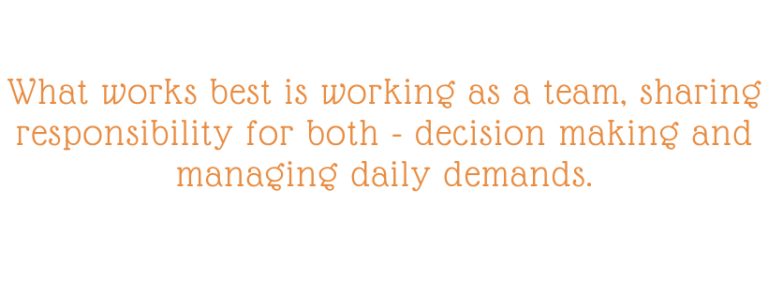
How to manage parent relations when you have a child with special needs
Raising a child together needs a working partnership between two partners. And when that child has a learning disability, it becomes more than essential that both parents work together to meet the demands and challenges that come with it. These demands can range from recognising the problem itself, seeking help and dealing with the diagnosis, communicating and collaborating with the school and related service providers. It might also entail advocating for your child when necessary.
How to manage parent relations – Work as a team
Meeting these constant needs often means that you have less time for each other, and if there is a difference of opinions on methods of helping your child, it can create stress. What works best is working as a team, sharing responsibility for decision-making and managing the child’s daily demands. Both parents should have the necessary knowledge of the child’s condition and the support they require. They should discuss all decisions and support each other as much as possible in this journey.

How to manage parent relations – Deal with disagreements
When two individuals with different temperaments and personalities are in a relationship, disagreements are going to occur. Parents can have differences of opinion on many issues, but the most common ones are about the child’s abilities, medication, independence, and future. It is exceedingly difficult to understand as a parent when the child is genuinely having difficulties or is taking advantage of the situation, especially with an older child who is aware of their diagnosis. One parent may want their child to be independent while the other might think that the child needs more support than what is currently given. The parents might disagree on where the child would go for education or which subjects they may choose in the future. They may also have disagreements on the amount of time each parent is dedicating to the child.

It does not matter if a disagreement arises, but it matters how you solve it together. To effectively communicate with your partner, you must choose the right time to talk. Start the conversation positively where both of you should stay focused on bringing a solution to the disagreement at hand and not try to prove who is right. If needed, take a break and give some time before resuming to avoid reacting and inflaming the situation. The cooling-down period will hopefully usher in reason and logic instead of reaction and anger, try to look at the situation through the eyes of your partner and find common ground. The key to resolving a disagreement is to really listen, ask questions about their point of view and repeat back to clarify if you understood your partner correctly. Work together to find a way to come to a reasonable solution. The guiding principle of resolving the disagreement should be that the child’s good holds priority, and everything else is secondary.
Disagreements are not necessarily damaging if you remember to discuss issues with understanding and compassion. It can give partners a fair chance to discuss each other’s feelings and concerns about the child’s welfare. It can be a chance to create innovative solutions and approaches to solve a problem. But it is of utmost importance that parents be on the same page once the decision is taken and maintain the course of action. If you think that the choices you have made are not working out at some point in time, revise and come up with a new solution together.
How to manage parent relations – Find alone time
Parents tend to be on their toes when it comes to taking care of a child with a learning disability. They are always planning, organising, and still, a solution that worked one day may not work the next day. All of this can be exhausting, and there may be little or no time left for each other. You should try to spend 20 to 30 minutes each day connecting, talking about each other rather than talking about your children. Focus on the positives and remember what you love about each other. Do not see each other only as caregivers for your children. Take some time away for yourself and your spouse. Go for a movie or dinner night or pursue a common interest together, that does not involve your child.

It is good to take short breaks with family where you do not have to follow an intensive caregiving routine. Short breaks are necessary to ensure the physical and mental well-being of the whole family. Breaks give you a chance to spend quality time with each other. Sometimes the best thing for a relationship to flourish is an escape from the day-to-day challenges, even if it is just for a little while.
How to manage parent relations – Create a sensitive social circle
Parents can often feel isolated because they often miss out on family-oriented activities as their child is unable to participate. They also encounter criticism and judgment from those who do not understand disability and make them feel like an outsider. Always remember parents can create their circle of support in understanding and trustworthy friends and family members to keep away the feeling of isolation. Find ways to spend time with them doing things you enjoy. Ask them for support in taking care of your children when you feel over exhausted. Take some time away for yourself and your spouse, go for a movie and dinner night or pursue a common interest, that does not involve your child.
How to manage parent relations – Talk to experts and community
It is essential to understand that you and your partner may not resolve all issues efficiently; there could be disagreements or feelings of stress or isolation that persist for a long time. There should not be any shame in consulting a qualified psychologist or counsellor who can provide you with analytical tools and strategies to cope with your feelings, deal with problems as a team in an efficient manner and ways to handle your child.
Often the most valuable support and information parents receive is from parents of other children with special needs. Be a part of any such community or forum that you can find around you. In case these communities do not exist in your city, you can take the initiative to start one. These communities can help you answer difficult questions, find resources and reliable professionals to ease some of the difficulties you face every day.